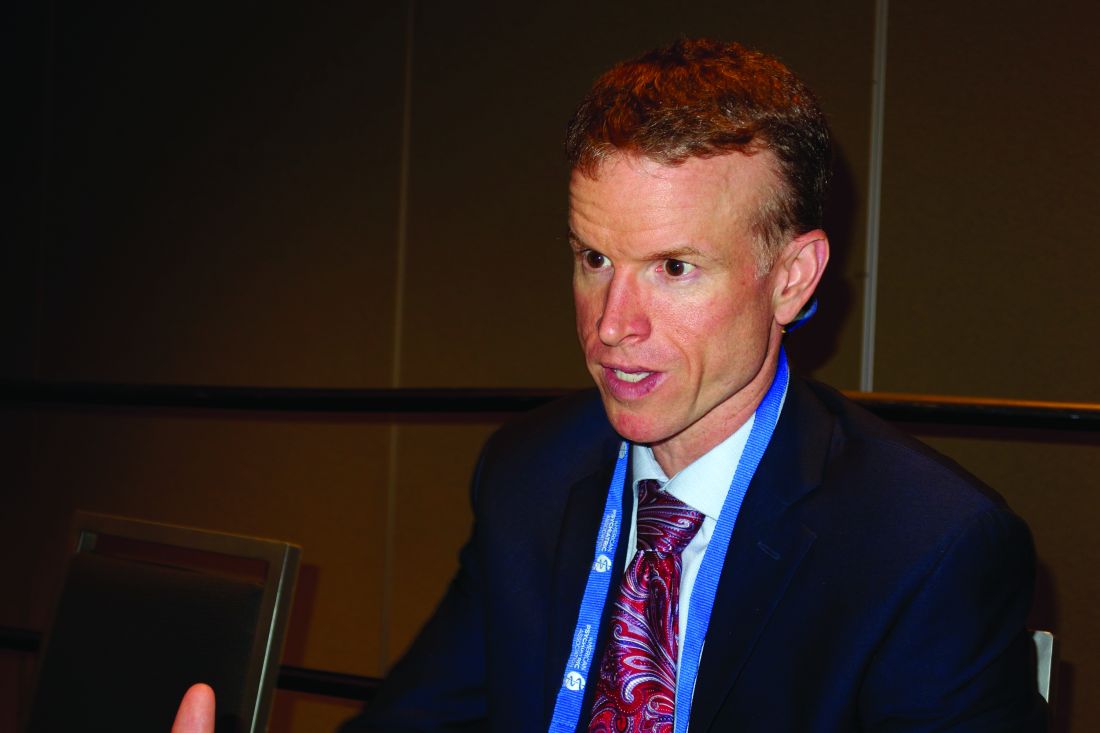User login
For now, CBD is better option than whole-plant cannabis for psychiatric disorders
SAN FRANCISCO – Outside of prescription products for chemotherapy nausea/vomiting, AIDS anorexia, and rare pediatric epilepsies, medical cannabis has the strongest evidence for chronic pain, neuropathic pain, and multiple sclerosis spasticity, according to Kevin P. Hill, MD, director of the division of addiction psychiatry at Beth Israel Deaconess Medical Center, Boston.
“We are talking about multiple, positive RCTs [randomized, controlled trials]. I think you can’t ignore that. For people who are staunchly opposed to medical cannabis, [it’s becoming] harder and harder to take that tack. I do think we need to come to an understanding that there is some evidence,” Dr. Hill said at the American Psychiatric Association annual meeting.
However, “there’s incredible interest in using cannabinoids for a whole host of [other] conditions for which the level of evidence isn’t where we’d like it to be. In many ways,” legalization has “far outpaced the evidence.
Perhaps that’s most true for psychiatric disorders. Although many patients swear by cannabis, what little evidence there is comes from observational studies, and those have mostly been disappointing.
Whole-plant cannabis, for instance, has been associated with an increased risk of depression in a dose-dependent fashion, and increased depression and anxiety symptoms, including panic attacks, among inexperienced users. Cutting back has been associated with symptom relief.
No placebo-controlled trials have been conducted to address cause and effect, so it’s unknown whether people use because they have worse disease or have worse disease because they use.
For now, “whole-plant cannabis to treat anxiety is probably not a good idea. We may ultimately find that cannabidiol” – CBD, the nonpsychoactive component of cannabis – “may have utility. If patients are already using, CBD is a better bet; it has no abuse potential,” Dr. Hill said.
He sometimes recommends CBD when patients fail traditional options, but over-the-counter or online products rather than the “exorbitantly expensive” Food and Drug Administration–approved version Epidiolex, indicated for the rare pediatric epilepsies Lennox-Gastaut and Dravet syndromes.
He asks patients to “tell me what you’re going to buy and we’ll go from there, and try to dose it.” Dr. Hill has confidence in only a few CBD brands to be accurately labeled, one of which is Charlotte’s Web.
There’s been a lot of excitement over cannabis for PTSD, but at this point, positive findings are mostly anecdotal, and use was associated with worse symptoms, increased violence, more alcohol and drug use, and worse therapy outcomes in a longitudinal study of 2,276 veterans. At least one ongoing RCT is underway that should address cause-and-effect (J Clin Psychiatry. 2015 Sep;76[9]:1174-80).
Like anxiety, CBD “would probably have more promise than whole-plant cannabis” for PTSD, Dr. Hill said.
That also might be the case for bipolar disorder. Whole-plant use is particularly common among patients, and it, again, seems to make symptoms worse.
The data for insomnia are much like that seen with alcohol: quicker asleep but worse sleep quality. “One of the myths about CBD is that it improves sleep; I don’t think that’s really been shown to be the case. A lot of it has to do with other chemicals included in the CBD preparation,” he said.
Dr. Hill is the author of Marijuana: The Unbiased Truth about the World’s Most Popular Weed (Center City, Minn.: Hazelden Publishing, 2015). He had no industry disclosures.
For now, CBD is better option than whole-plant cannabis for psychiatric disorders
For now, CBD is better option than whole-plant cannabis for psychiatric disorders
SAN FRANCISCO – Outside of prescription products for chemotherapy nausea/vomiting, AIDS anorexia, and rare pediatric epilepsies, medical cannabis has the strongest evidence for chronic pain, neuropathic pain, and multiple sclerosis spasticity, according to Kevin P. Hill, MD, director of the division of addiction psychiatry at Beth Israel Deaconess Medical Center, Boston.
“We are talking about multiple, positive RCTs [randomized, controlled trials]. I think you can’t ignore that. For people who are staunchly opposed to medical cannabis, [it’s becoming] harder and harder to take that tack. I do think we need to come to an understanding that there is some evidence,” Dr. Hill said at the American Psychiatric Association annual meeting.
However, “there’s incredible interest in using cannabinoids for a whole host of [other] conditions for which the level of evidence isn’t where we’d like it to be. In many ways,” legalization has “far outpaced the evidence.
Perhaps that’s most true for psychiatric disorders. Although many patients swear by cannabis, what little evidence there is comes from observational studies, and those have mostly been disappointing.
Whole-plant cannabis, for instance, has been associated with an increased risk of depression in a dose-dependent fashion, and increased depression and anxiety symptoms, including panic attacks, among inexperienced users. Cutting back has been associated with symptom relief.
No placebo-controlled trials have been conducted to address cause and effect, so it’s unknown whether people use because they have worse disease or have worse disease because they use.
For now, “whole-plant cannabis to treat anxiety is probably not a good idea. We may ultimately find that cannabidiol” – CBD, the nonpsychoactive component of cannabis – “may have utility. If patients are already using, CBD is a better bet; it has no abuse potential,” Dr. Hill said.
He sometimes recommends CBD when patients fail traditional options, but over-the-counter or online products rather than the “exorbitantly expensive” Food and Drug Administration–approved version Epidiolex, indicated for the rare pediatric epilepsies Lennox-Gastaut and Dravet syndromes.
He asks patients to “tell me what you’re going to buy and we’ll go from there, and try to dose it.” Dr. Hill has confidence in only a few CBD brands to be accurately labeled, one of which is Charlotte’s Web.
There’s been a lot of excitement over cannabis for PTSD, but at this point, positive findings are mostly anecdotal, and use was associated with worse symptoms, increased violence, more alcohol and drug use, and worse therapy outcomes in a longitudinal study of 2,276 veterans. At least one ongoing RCT is underway that should address cause-and-effect (J Clin Psychiatry. 2015 Sep;76[9]:1174-80).
Like anxiety, CBD “would probably have more promise than whole-plant cannabis” for PTSD, Dr. Hill said.
That also might be the case for bipolar disorder. Whole-plant use is particularly common among patients, and it, again, seems to make symptoms worse.
The data for insomnia are much like that seen with alcohol: quicker asleep but worse sleep quality. “One of the myths about CBD is that it improves sleep; I don’t think that’s really been shown to be the case. A lot of it has to do with other chemicals included in the CBD preparation,” he said.
Dr. Hill is the author of Marijuana: The Unbiased Truth about the World’s Most Popular Weed (Center City, Minn.: Hazelden Publishing, 2015). He had no industry disclosures.
SAN FRANCISCO – Outside of prescription products for chemotherapy nausea/vomiting, AIDS anorexia, and rare pediatric epilepsies, medical cannabis has the strongest evidence for chronic pain, neuropathic pain, and multiple sclerosis spasticity, according to Kevin P. Hill, MD, director of the division of addiction psychiatry at Beth Israel Deaconess Medical Center, Boston.
“We are talking about multiple, positive RCTs [randomized, controlled trials]. I think you can’t ignore that. For people who are staunchly opposed to medical cannabis, [it’s becoming] harder and harder to take that tack. I do think we need to come to an understanding that there is some evidence,” Dr. Hill said at the American Psychiatric Association annual meeting.
However, “there’s incredible interest in using cannabinoids for a whole host of [other] conditions for which the level of evidence isn’t where we’d like it to be. In many ways,” legalization has “far outpaced the evidence.
Perhaps that’s most true for psychiatric disorders. Although many patients swear by cannabis, what little evidence there is comes from observational studies, and those have mostly been disappointing.
Whole-plant cannabis, for instance, has been associated with an increased risk of depression in a dose-dependent fashion, and increased depression and anxiety symptoms, including panic attacks, among inexperienced users. Cutting back has been associated with symptom relief.
No placebo-controlled trials have been conducted to address cause and effect, so it’s unknown whether people use because they have worse disease or have worse disease because they use.
For now, “whole-plant cannabis to treat anxiety is probably not a good idea. We may ultimately find that cannabidiol” – CBD, the nonpsychoactive component of cannabis – “may have utility. If patients are already using, CBD is a better bet; it has no abuse potential,” Dr. Hill said.
He sometimes recommends CBD when patients fail traditional options, but over-the-counter or online products rather than the “exorbitantly expensive” Food and Drug Administration–approved version Epidiolex, indicated for the rare pediatric epilepsies Lennox-Gastaut and Dravet syndromes.
He asks patients to “tell me what you’re going to buy and we’ll go from there, and try to dose it.” Dr. Hill has confidence in only a few CBD brands to be accurately labeled, one of which is Charlotte’s Web.
There’s been a lot of excitement over cannabis for PTSD, but at this point, positive findings are mostly anecdotal, and use was associated with worse symptoms, increased violence, more alcohol and drug use, and worse therapy outcomes in a longitudinal study of 2,276 veterans. At least one ongoing RCT is underway that should address cause-and-effect (J Clin Psychiatry. 2015 Sep;76[9]:1174-80).
Like anxiety, CBD “would probably have more promise than whole-plant cannabis” for PTSD, Dr. Hill said.
That also might be the case for bipolar disorder. Whole-plant use is particularly common among patients, and it, again, seems to make symptoms worse.
The data for insomnia are much like that seen with alcohol: quicker asleep but worse sleep quality. “One of the myths about CBD is that it improves sleep; I don’t think that’s really been shown to be the case. A lot of it has to do with other chemicals included in the CBD preparation,” he said.
Dr. Hill is the author of Marijuana: The Unbiased Truth about the World’s Most Popular Weed (Center City, Minn.: Hazelden Publishing, 2015). He had no industry disclosures.
REPORTING FROM APA 2019

